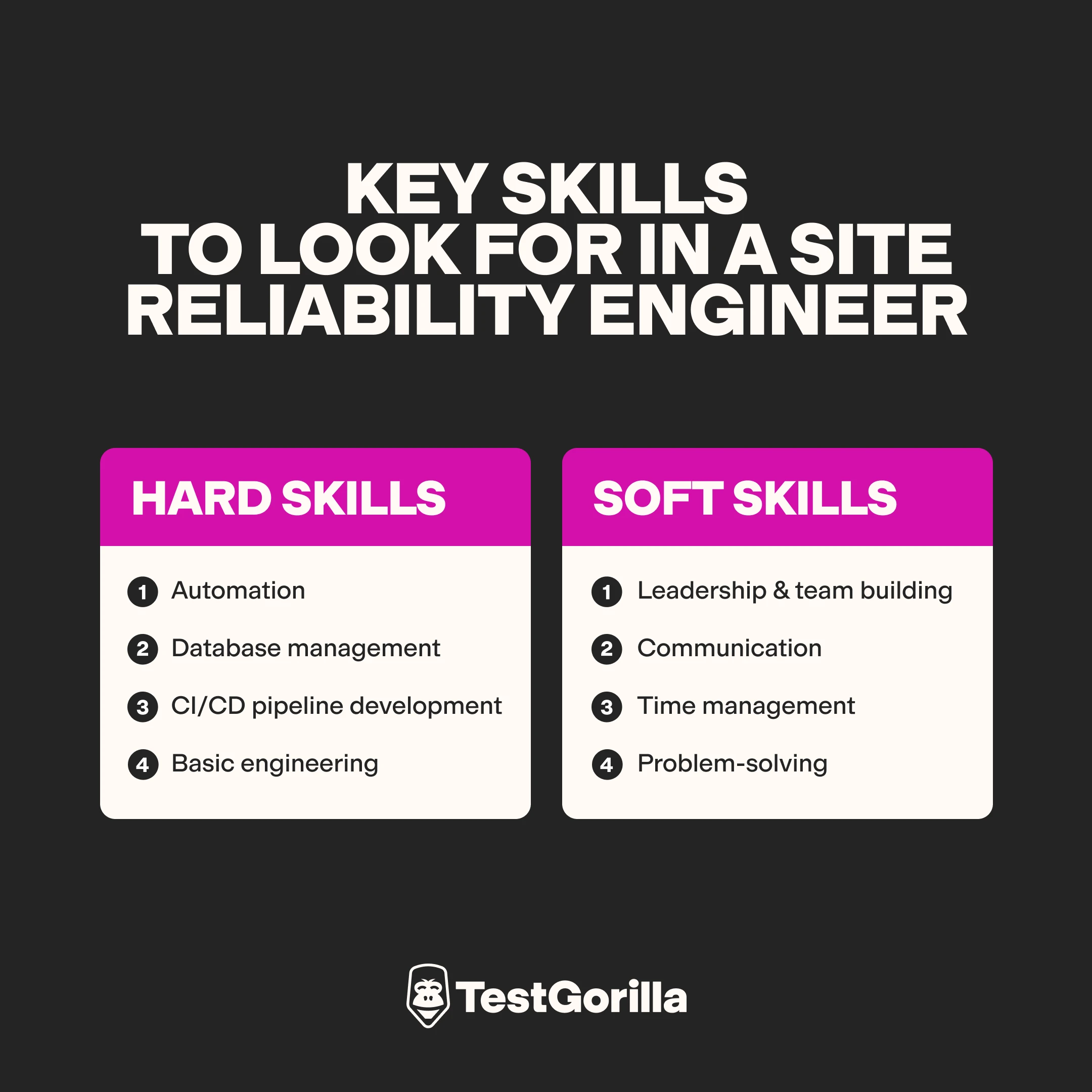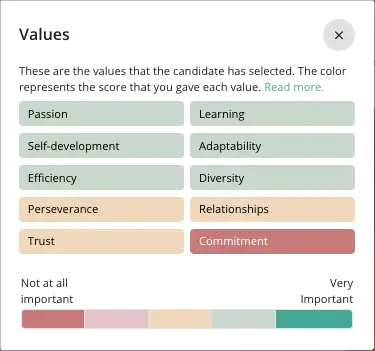How to write a site reliability engineer job description
Assess and hire the best site reliability engineers
Site reliability engineers – software developers with IT operations experience – are the backbone of IT environments as professionals who “keep the lights on.” They need a unique combination of skills because they serve as bridges between development and operations teams.
To hire the best, you need a bulletproof site reliability engineer job description that identifies their skills, responsibilities, and requirements.
Below, we look at what a site reliability engineer is, their core hard and soft skills, and how to write a job description that stands out on job boards and attracts top candidates.
However, we can’t do any of that until we understand the basics. So, what does a site reliability engineer do? Let’s find out.
Table of contents
- What is a site reliability engineer?
- What does a site reliability engineer do?
- Key skills to look for in a site reliability engineer
- How to write an effective site reliability engineer job description
- Software reliability engineer job description template
- Site reliability engineer salary
- Next steps: Attract and assess site reliability engineers
- Use a site reliability engineer job description and skills tests to hire the best
- Site reliability engineer job description FAQs
What is a site reliability engineer?
A site reliability engineer is an IT expert who monitors, controls, and automates software, websites, and apps to ensure their reliability in a production environment. Their expertise is crucial across industries because they identify problems in software and write code to fix them.
It’s important to differentiate between site reliability engineers and other types of reliability engineers, which include:
Manufacturing plant reliability engineers: production specialists who maximize a plant’s uptime and reduce production and maintenance losses and costs
Reliability design engineers: designers who assess product design to ensure optimal performance and mitigate reliability risk
What does a site reliability engineer do?
A site reliability engineer identifies and manages risks that can disrupt software development and fixes anomalous behaviors in applications and software.
For example, a site reliability engineer could monitor performance metrics and submit a report to the software engineering team if they detect an issue. The team runs root-cause analyses to identify problem areas and uses statistical data to minimize losses.
So, what is site reliability engineering (SRE)?
SRE refers to site reliability engineers working as part of a software team. It is a practical application of DevOps or a culture of using software tools to improve collaboration and keep up with the pace of software releases.
According to DevOps Institute Research, site reliability engineering (SRE) is on the rise. In 2021, 22% of businesses adopted an SRE role, up from 15% in the previous year, and it’s expected to double and continue growing over the course of this decade.
Software reliability engineers have three main responsibilities:
System support: providing documented procedures to deal with complaints, create new features, and stabilize the production environment
Operations: managing emergency incident response, automation, and change and IT infrastructure management
Process improvement: improving the lifecycle of software development through post-incident reviews and documentation
Tech giants like Google suggest restricting site reliability engineers’ operational work to 50% of their time to ensure they have enough time in their schedule to maintain service stability and prevent outages. This includes having an on-call rotation to handle escalation tickets that come in.
Key skills to look for in a site reliability engineer
The primary skills of a site reliability engineer, like coding languages and automation, overlap with those of software engineers. However, they also have dedicated skills to deal with incident response and failure analysis.
Let’s look at the skills you need on an SRE team – you want to include them when you write your site reliability engineer job description to attract the best candidates.
Site reliability engineer hard skills
Site reliability engineers are in high demand because of increased DevOps adoption.
To keep up with the competition, you should ensure that site reliability engineer candidates are able to prove a variety of technical skills. The skills below are the most common technical skills required by a software reliability engineer.
Hard skills | Description |
Automation | The site reliability engineer candidate automates repetitive tasks to create more time to focus on other duties that require a human touch |
Database management | The applicant knows the characteristics of common operating systems, understands data models, and works effectively with relational and nonrelational databases |
CI/CD pipeline development | The would-be site reliability engineer is skilled in constructing CI/CD pipelines through automated testing to improve software delivery when launching new software versions |
The job seeker can provide technical support for and understands the basics of mechanical, electrical, and systems engineering |
Site reliability engineer soft skills
Hard skills matter, but they’re not the be-all and end-all of a site reliability engineer’s experience. Site reliability engineers also require soft skills that cannot be easily trained or developed.
As such, you should pay attention to your candidates' soft skill set, even if they excel in technical skills. These soft skills include:
Soft skills | Description |
Leadership and team building | The site reliability engineer applicant mentors staff, uses work delegation, manages teams, provides feedback, and promotes continuous development |
Communication | The candidate can effectively participate in the technical and business aspects of the company, convey concepts clearly to third parties without overdependence on technical jargon, and translate customer requests to technical jargon for their would-be team |
The site reliability engineer prioritizes tasks and keeps a high level of organization, managing their team and making time for their own duties | |
Problem-solving | The job seeker can troubleshoot by analyzing situations to offer practical solutions to many issues |
Discover and assess site reliability engineer soft skills with a Free Forever account.
How to write an effective site reliability engineer job description
You should remember three main things as you write your SRE job description. With these guidelines, you can facilitate your decision-making when selecting candidates who get your company’s unique requirements
1. Don’t gloss over technical requirements
When recruiting for software engineering positions like site reliability engineers, you should include the programming languages required, the distributed storage technologies you use, and any other technical skills your candidates need to master before hopping on workflows.
You attract qualified candidates if you’re transparent about the technical requirements and responsibilities of a site reliability engineer to support your software and DevOps teams.
2. Highlight collaboration
Site reliability engineers must collaborate with and support teams. In their day-to-day work, they must work with front-end and back-end teams to maintain system reliability.
Be clear about your expectations in this area to help them understand your team dynamics and develop good working relationships.
3. Clarify your needs and expectations
Not every software reliability engineer position comes with the same expectations.
For example, are you looking for someone to monitor site health or perform systems administration? Alternatively, are your needs more complex, like troubleshooting performance issues, data analysis, and managing infrastructure?
Ensure you list these requirements clearly in your job description template.
Software reliability engineer job description template
Below, we include a standard software reliability engineer job description template. A job posting’s purpose is to answer the crucial question your candidates must know: "What is a site reliability engineer, and what do they need to do for your company?”
Candidates may be familiar with the job title and role. Nevertheless, they need to understand the differences between your position and all the other open site reliability engineer positions.
This way, you attract the most qualified candidates for your specific needs, regardless of whether you need to write a principal site reliability engineer job description or a junior site reliability engineer job description.
Company introduction
Briefly introduce your company. Share its name, industry, mission, and vision, and discuss your products. Don’t forget to mention specific achievements and milestones relevant to a site reliability engineer.
Benefits of working with [your company]
Discuss your benefits package, including items like unlimited time off, health benefits, customized training and development opportunities, and retirement plans. Mention specific perks, like in-house childcare facilities or a flexible time-off policy.
Site reliability engineer job brief
[Company name]
Job Title: [Site reliability engineer]
Reports to: [Principal site reliability engineer]
Position Type: [Full-time, part-time, or contract]
Location: [On-site, remote, or hybrid]
[Compensation and benefits information]
Site reliability engineer responsibilities and duties
Run the production environment and monitor high availability and system health
Improve reliability, quality, and time-to-market for all software versions
Build systems to manage applications and infrastructure
Gather and analyze data from operating systems to troubleshoot and fine-tune performance
Offer primary engineering and operational support for distributed software applications
Work with development teams to test and improve services
Measure and optimize system performance
Contribute to platform management, capacity planning, design consulting, service level objective (SLOs) establishment
Push for continuous improvement and anticipate customer needs
Use automation to create sustainable services
Site reliability engineer qualifications and skills
Required skills and experience
Ability to use structured and OOP programming in at least one high-level language like JavaScript, Ruby, Python, Java, or C++
A proactive approach to troubleshooting bottlenecks, problems, and areas of improvement
Knowledge of distributed storage technologies, such as Amazon S3 and NFS, and dynamic resource management frameworks, like Kubernetes and Apache Mesos
Data analytics skills
Computer science skills
Bachelor’s degree or master’s degree in engineering, statistics, computer science, or math
Preferred skills and experience
Coding experience exceeding simple scripts
Familiarity with Six Sigma methodology
Site reliability engineer certification
Previous experience working in the site reliability engineer field
Advanced analytical skills
Site reliability engineer salary
With our site reliability engineer job description out of the way, we can look at your new employee’s salary expectations.
The average site reliability engineer salary is $130,980, while the median is $120,000.
However, more senior site reliability engineers can earn more than these figures. According to the same source, a highly experienced site reliability engineer can earn a maximum salary of $300,000.
There’s a good reason this position pays highly. The average cost of downtime in the IT industry is $5,600 per minute, which can add up to $450,000 per hour for a large company.
You’re better off offering a high salary upfront for a skilled site reliability engineer than facing losses that could amount to two or three times their salary in one hour of downtime.
Next steps: Attract and assess site reliability engineers
Once you have your site reliability engineer job description, upload it to job websites like LinkedIn or Indeed or dedicated software hiring platforms. Alternatively, ask your employees for referrals or use a recruiter like redShift, which specializes in providing site reliability engineer candidates.
Once you post your job description, you need to prepare for candidates. The main thing to consider is how to assess their skills and verify they’ll be a good fit for the site reliability engineer role.
Site reliability engineer talent assessments are the best way to ensure your candidates have the hard and soft skills they need to join your company as site reliability engineers. Assessments are better than resumes because you receive an objective view of each candidate’s score.
Say goodbye to outdated resumes and unlock the power of talent assessments in your hiring process.
Hiring the right candidates for highly skilled technical positions is crucial because mis-hires feel overwhelmed and often quickly leave a position they don’t feel qualified for, causing instant attrition and higher stress levels for remaining employees.
Orbit Technologies, a semiconductor services provider hiring for highly technical engineering jobs, suffered from this issue. Once the company started using our talent assessments to evaluate applicants, its instant attrition rates decreased by 50%.
Talent assessments do more than attest to your candidates’ skills. They also let you evaluate their culture add potential, and how well they will gel and contribute to your company ethos.
Consider the following tests for your site reliability engineer candidates:
The Ansible Online test lets you evaluate the candidates’ abilities to use Ansible to create, manage, and improve automation.
Note: We also have a Terraform test if you use it instead of Ansible as your infrastructure-as-code software tool.
Our Database Management and Administration test assesses your applicants’ understanding of core approaches to supplying data to applications, database security, and database performance management.
The Jenkins test evaluates your would-be site reliability engineers’ proficiencies in managing CI/CD infrastructure by deploying, configuring, and securing Jenkins.
See more example questions from our Jenkins test.
Our Communication Skills test gauges your candidates’ abilities to communicate effectively, which is an important asset for a person responsible for cross-functional communications with various teams.
Our Culture Add test ensures applicants’ values and beliefs align with your company. If they’re the right addition to your team, you know you’re hiring a site reliability engineer who can grow alongside the rest of your team.
The Python Data Structures & Objects test helps you measure your site reliability engineer candidates’ Python coding abilities and their object-oriented programming skills.
Your next move is to short-list candidates and use a structured interview with site reliability engineering-specific interview questions to better understand their personalities and skills and find the perfect match for your organization.
Use a site reliability engineer job description and skills tests to hire the best
With our site reliability engineer job description template, you can show job seekers what you need and hire top engineering talent.
You now understand the skills needed by effective site reliability engineers, so you can easily include the essential duties and qualifications in your job description template.
Once the applications start rolling in, use our assessments to test your candidates’ skills.
Try out our demo to learn how our assessments help you find the best addition to your team.
Then, sign up for our Free Forever plan to experience firsthand what you can achieve with our tests!
Site reliability engineer job description FAQs
Let’s cap off this deep dive into how to write a site reliability engineering job description with some frequently asked questions about site reliability engineers.
What are the skills required for a site reliability engineer?
Coding languages like Python, Java, and Go and understanding operating systems
Distributed computing and CI/CD pipeline development
Automation skills and monitoring
Understanding databases and cloud-native application skills
Using version control tools
Time management, problem-solving, and communication
Project management and infrastructure orchestration
Using incident management tools
Is SRE and DevOps the same?
The main difference between SRE and DevOps is the focus. SRE deals with the stability of the production environment and deliveries. On the other hand, a DevOps engineer deals with the end-to-end application lifecycle. Site reliability engineer vs. DevOps aren’t divergent – they complement each other, making it easy for companies to use both.
Is a site reliability engineer a software engineer?
A site reliability engineer is a type of software engineer who ensures existing software is reliable. They know how to code and “keep the lights on” in an IT environment. Their focus is different from that of a software engineer, who is primarily involved in designing and building new software systems.
Related posts
Hire the best candidates with TestGorilla
Create pre-employment assessments in minutes to screen candidates, save time, and hire the best talent.
Latest posts
The best advice in pre-employment testing, in your inbox.
No spam. Unsubscribe at any time.

Hire the best. No bias. No stress.
Our screening tests identify the best candidates and make your hiring decisions faster, easier, and bias-free.
Free resources
This checklist covers key features you should look for when choosing a skills testing platform
This resource will help you develop an onboarding checklist for new hires.
How to assess your candidates' attention to detail.
Learn how to get human resources certified through HRCI or SHRM.
Learn how you can improve the level of talent at your company.
Learn how CapitalT reduced hiring bias with online skills assessments.
Learn how to make the resume process more efficient and more effective.
Improve your hiring strategy with these 7 critical recruitment metrics.
Learn how Sukhi decreased time spent reviewing resumes by 83%!
Hire more efficiently with these hacks that 99% of recruiters aren't using.
Make a business case for diversity and inclusion initiatives with this data.
























